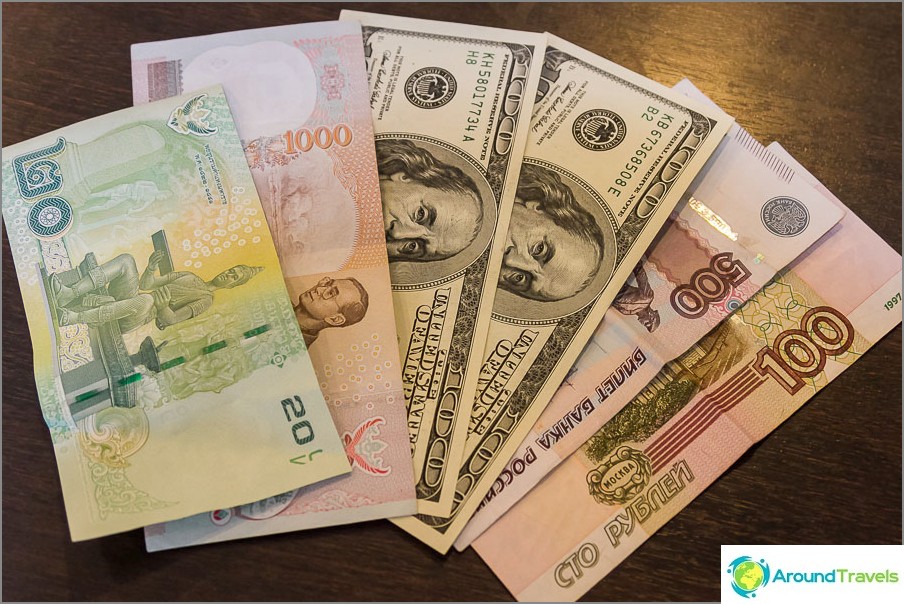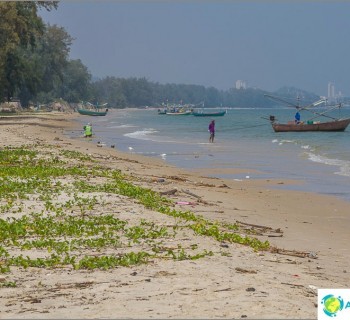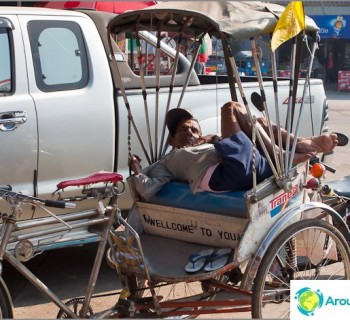It seems to have already repeatedly written about that, which bank card to choose and why are they needed at all, about that, how to withdraw money in Thailand, but the specific answer to the question of what money to take to Thailand remained behind the scenes. Although somewhere in the comments it is said or in passing in the articles themselves ... But since I receive this question with a certain frequency, I fill the gap in the form of a separate article.
I want to note that this post is relevant not only for Thailand, but also for other foreign countries, especially for those where the currency is tugriks (not euros or dollars).
The content of the article
- one Briefly about what money to take to Thailand
- 2 Details about what money to take to Thailand
- 3 How to reduce commission costs
Briefly about what money to take to Thailand
The currency in Thailand is Thai Baht. You can't buy them everywhere in Russia, and I wouldn't do that either. And why? Take your dollars with you and you won't be mistaken, exchangers in Thailand are at every turn. Only in Russia in the exchanger is it better to guess the rate more profitable.
Another effortless option is to take your bank cards with you, which you also use in everyday life. The main thing is that this card is accepted abroad, that is, those intended only for Russia will not work. Any will do, but it is better not lower than Visa Classic or Mastercard Standart. The currency of the bank card account (if you don't bother) is not so important, but all things being equal, dollar cards are preferable. Actually, I already wrote, why do you need bank cards when traveling, recommended using travel credit cards for payment or debit cards for withdrawing cash with a good rate. For a long time I have been trying to minimize cash spending, although it is difficult to do it in Thailand, terminals are only in large stores.

What money to take to Thailand
Details about what money to take to Thailand
Briefly answered the question, now we will take a closer look at all possible cases, because if you go deeper and try to minimize losses on currency conversions, you will have to understand the topic a little. But if you don't want to, then I have already written the tips above..
All options, what to take
- Rubles. They are taken in Thailand mainly only in Pattaya / Phuket / Bangkok, and even then not everywhere, so they can be considered relatively useless, you will have to look for an exchanger, and the rate will be so-so. I also read that Bangkok Bank started accepting, but did not check it myself. The course is listed on their website and it is extortionate.
- Cash dollars and euros. On the spot, they can be exchanged for Thai baht at any exchanger or bank, of which there are more than enough in the country. This option is great for those who don't use bank cards much, or just don't want to bother..
- Bank card with a ruble account. In my opinion, one of the most convenient options without problems if you are going on vacation for a couple of weeks. All these troubles with special cards, for the sake of saving a couple of cents, are useless. And you need to know that a bank card is much safer than cash. If you lose cash, then you're done, and the card can always be blocked, plus there are limits on the operation. In Thailand, it will be possible to use a ruble card withdraw Thai baht at an ATM or bank or pay for purchases in supermarkets. There will be two conversions, usually through dollars (THB => USD => RUB).
- Bank card with a dollar account. More profitable option. But it is suitable for those who have income in dollars, or who follow the exchange rates and buy in dollars and euros on time. There will be only one conversion for such a card (THB => USD). Withdrawing money happens in the same way: at ATMs and banks. Better to take Mastercsrd, usually there are fewer commissions on it.
- Bank card with a euro account. Usually so-so, because it is needed for countries where the euro is in circulation, and not tugriks. You need to find out from your bank how the conversions take place, because there is a risk of getting into 2 conversions (THB => USD => EUR).
More details about, how to convert rubles to baht, you can read in my article. There I gave a specific example with commissions and conversions, if baht was withdrawn from a ruble card and from a dollar.
Card with ruble or dollar account?
Why do I think that a bank card with a ruble account is one of the most convenient options? Firstly, it makes no sense to get a currency card for the sake of a two-week trip abroad, you will save a little. Rather, a bother with maps for travel is needed either for those who want to get confused, or for those who often travel abroad.
Secondly, most of the income in rubles and ruble cards are already available. Moreover, if you set up a card with a dollar account especially for a trip, exchange rubles for dollars and replenish your account, you will receive exactly the same conversion scheme (baht => dollars => rubles), just one of the conversions (dollars-rubles) you spend yourself in Russia in the exchange office before the trip. And here you need to understand that if you buy dollars in advance at a good rate, and the dollar continues to grow, then you will win. If everything goes the other way around and the dollar falls, you will lose. If not clear, then read this post, I sorted it out in detail.
Of course, if you follow the exchange rates, you know that the dollar is growing now and will continue to grow, then you most likely will not have any questions about which card and in which currency to take with you. Obviously, you can safely buy bucks and put them on a dollar card, you are unlikely to go wrong. And again, those who follow the foreign exchange market usually have in stock ruble cards, both dollar and euro, and know how to quickly exchange the desired currency online. But for an ordinary person who is going on vacation, these can only be extra chores, nevertheless, you can watch my selection of travel maps.
Cash dollars
Most vacationers simply take cash dollars with them. As I said above, this is a good option for those who do not want to figure it out. We went to the exchanger, bought several thousand (well, or how many you need there) and that's it, no additional actions and hassles with finding out the commissions of bank cards. Actually, you can continue to do so. Even if the exchange rate suddenly changes for you for the worse (the ruble will rise and the dollar will fall), then in a short time (vacation) you are unlikely to lose much. That is, course changes will not be noticeable for you..
However, I would still advise you to stock up on a bank card, ruble or dollar. Since money may run out, and it is better to keep the emergency stock in a bank account, and not in your pocket, it is safer. Well, and winterers, in my opinion, nowhere without a map. It's one thing to plan spending for 1-2 weeks, another - for 6 months.
How to reduce commission costs
Does it make a difference what money to take to Thailand if you are going for the winter, and not for a couple of weeks on vacation? I answered for myself «No», and I go further with bank cards (different currencies) and take some cash with me, just in case. However, here's what else you need to do in order to reduce your commission costs:
- Find out which banks are in your city and find out what their real commissions are for converting (call the bank, read on the forums), as well as who does not have a commission for withdrawing cash from an ATM of a third-party bank. Thus, you can try to reduce the cost of all sorts of commissions, of which there may be a lot for the entire winter. True, it will take time. You can start from my selection of cards.
- Withdraw not at ATMs, but at the bank's cash desk, there is no commission of 180 baht for withdrawal.
- Convert your income into dollars, get a dollar bank card in Russia, open an account in a Thai bank and get a Thai card to which you can transfer money from Russian accounts or profitably withdraw WebMoney (if you have one).
Well, after you have decided what to take dollars, rubles, or bank cards, you will need to find out, and how much money to take to Thailand. True, during wintering, spending can be completely different, both downward and upward..
P.S. A few hundred cash dollars, just in case, is always good to have in your wallet on any trip abroad, you never know what happens to the card, or some other situation that it is impossible or inconvenient to withdraw from the card, but the cash is urgently needed.
P.P.S. Due to the instability of the ruble, it makes sense not only to take a dollar card, but also to transfer half (or even more) of your savings into foreign currency..

